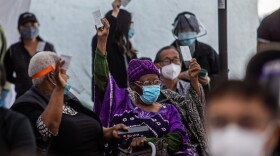The Texas Department of State Health Services is using about $45 million in federal funding to address COVID-19 among people in high-risk and underserved communities.
An agency within the department has been renamed the Office of Health Equity Policy and Performance. With money from a CDC grant, the office will work with state and local public health entities across Texas to address disparities in health outcomes among different populations.
In a letter sent Wednesday to the commissioner of the Texas Department of State Health Services, state Rep. Garnet Coleman of Houston applauded state health officials for focusing on the issue.
“I would like to thank you for taking the initiative to use the funds to create the Office of Health Equity Policy and Performance (OHEPP),” he wrote. “Like the office I envisioned in my bill, the OHEPP will have a cross-system approach and work with local health agencies to look at vulnerable populations (including along the lines of race and ethnicity, gender, age, socioeconomic status, geography, etc) to ensure that Texas has a more proactive and unified strategy in working towards health equity.”
During the last legislative session, Coleman introduced a bill that would have created a similar office called the Office for Health Equity. The bill, House Bill 4139, was a priority in the House, where it eventually passed. It was blocked by the Texas Senate, however, and didn’t even get a hearing.
DSHS said Thursday the initiative was not connected to these legislative efforts.
Texas used to have a state agency tasked with tackling institutional racism and other barriers to health care access. In 2017, lawmakers defunded the agency, which was called the Center for Elimination of Disproportionality and Disparities. It officially shut its doors in August 2018.
State lawmakers said resurrecting the agency was a priority this year because Texans in communities of color were more likely to be exposed, get sick, be hospitalized and die from COVID-19. There have also been issues with making sure vulnerable communities are vaccinated at the same rate as other Texans.
Coleman said when a crisis happens there are always communities that are more likely to face worse health outcomes.
“[The pandemic] is not the only time that has happened,” he told KUT. “And it’s very important that we use the public health system and infrastructure to reduce the number of people who are part of that outlier group.”
In his letter to DSHS Commissioner John Hellersted, Coleman said he hopes to work with health officials and state leadership “to establish a more permanent funding source for this critical office into the future.”


















